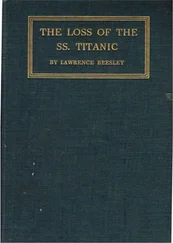On Tuesday the survivors met in the saloon and formed a committee among themselves to collect subscriptions for a general fund, out of which it was resolved by vote to provide as far as possible for the destitute among the steerage passengers, to present a loving cup to Captain Rostron and medals to the officers and crew of the Carpathia, and to divide any surplus among the crew of the Titanic. The work of this committee is not yet (June 1st) at an end, but all the resolutions except the last one have been acted upon, and that is now receiving the attention of the committee. The presentations to the captain and crew were made the day the Carpathia returned to New York from her Mediterranean trip, and it is a pleasure to all the survivors to know that the United States Senate has recognized the service rendered to humanity by the Carpathia and has voted Captain Rostron a gold medal commemorative of the rescue. On the afternoon of Tuesday, I visited the steerage in company with a fellow-passenger, to take down the names of all who were saved. We grouped them into nationalities,—English Irish, and Swedish mostly,—and learnt from them their names and homes, the amount of money they possessed, and whether they had friends in America. The Irish girls almost universally had no money rescued from the wreck, and were going to friends in New York or places near, while the Swedish passengers, among whom were a considerable number of men, had saved the greater part of their money and in addition had railway tickets through to their destinations inland. The saving of their money marked a curious racial difference, for which I can offer no explanation: no doubt the Irish girls never had very much but they must have had the necessary amount fixed by the immigration laws. There were some pitiful cases of women with children and the husband lost; some with one or two children saved and the others lost; in one case, a whole family was missing, and only a friend left to tell of them. Among the Irish group was one girl of really remarkable beauty, black hair and deep violet eyes with long lashes, and perfectly shaped features, and quite young, not more than eighteen or twenty; I think she lost no relatives on the Titanic.
The following letter to the London “Times” is reproduced here to show something of what our feeling was on board the Carpathia towards the loss of the Titanic. It was written soon after we had the definite information on the Wednesday that ice warnings had been sent to the Titanic, and when we all felt that something must be done to awaken public opinion to safeguard ocean travel in the future. We were not aware, of course, how much the outside world knew, and it seemed well to do something to inform the English public of what had happened at as early an opportunity as possible. I have not had occasion to change any of the opinions expressed in this letter.
SIR:—
As one of few surviving Englishmen from the steamship Titanic, which sank in mid-Atlantic on Monday morning last, I am asking you to lay before your readers a few facts concerning the disaster, in the hope that something may be done in the near future to ensure the safety of that portion of the travelling public who use the Atlantic highway for business or pleasure.
I wish to dissociate myself entirely from any report that would seek to fix the responsibility on any person or persons or body of people, and by simply calling attention to matters of fact the authenticity of which is, I think, beyond question and can be established in any Court of Inquiry, to allow your readers to draw their own conclusions as to the responsibility for the collision.
First, that it was known to those in charge of the Titanic that we were in the iceberg region; that the atmospheric and temperature conditions suggested the near presence of icebergs; that a wireless message was received from a ship ahead of us warning us that they had been seen in the locality of which latitude and longitude were given.
Second, that at the time of the collision the Titanic was running at a high rate of speed.
Third, that the accommodation for saving passengers and crew was totally inadequate, being sufficient only for a total of about 950. This gave, with the highest possible complement of 3400, a less than one in three chance of being saved in the case of accident.
Fourth, that the number landed in the Carpathia, approximately 700, is a high percentage of the possible 950, and bears excellent testimony to the courage, resource, and devotion to duty of the officers and crew of the vessel; many instances of their nobility and personal self-sacrifice are within our possession, and we know that they did all they could do with the means at their disposal.
Fifth, that the practice of running mail and passenger vessels through fog and iceberg regions at a high speed is a common one; they are timed to run almost as an express train is run, and they cannot, therefore, slow down more than a few knots in time of possible danger.
I have neither knowledge nor experience to say what remedies I consider should be applied; but, perhaps, the following suggestions may serve as a help:—
First, that no vessel should be allowed to leave a British port without sufficient boat and other accommodation to allow each passenger and member of the crew a seat; and that at the time of booking this fact should be pointed out to a passenger, and the number of the seat in the particular boat allotted to him then.
Second, that as soon as is practicable after sailing each passenger should go through boat drill in company with the crew assigned to his boat.
Third, that each passenger boat engaged in the Transatlantic service should be instructed to slow down to a few knots when in the iceberg region, and should be fitted with an efficient searchlight.
Yours faithfully,
LAWRENCE BEESLEY.
It seemed well, too, while on the Carpathia to prepare as accurate an account as possible of the disaster and to have this ready for the press, in order to calm public opinion and to forestall the incorrect and hysterical accounts which some American reporters are in the habit of preparing on occasions of this kind. The first impression is often the most permanent, and in a disaster of this magnitude, where exact and accurate information is so necessary, preparation of a report was essential. It was written in odd corners of the deck and saloon of the Carpathia, and fell, it seemed very happily, into the hands of the one reporter who could best deal with it, the Associated Press. I understand it was the first report that came through and had a good deal of the effect intended.
The Carpathia returned to New York in almost every kind of climatic conditions: icebergs, ice-fields and bitter cold to commence with; brilliant warm sun, thunder and lightning in the middle of one night (and so closely did the peal follow the flash that women in the saloon leaped up in alarm saying rockets were being sent up again); cold winds most of the time; fogs every morning and during a good part of one day, with the foghorn blowing constantly; rain; choppy sea with the spray blowing overboard and coming in through the saloon windows; we said we had almost everything but hot weather and stormy seas. So that when we were told that Nantucket Lightship had been sighted on Thursday morning from the bridge, a great sigh of relief went round to think New York and land would be reached before next morning.
There is no doubt that a good many felt the waiting period of those four days very trying: the ship crowded far beyond its limits of comfort, the want of necessities of clothing and toilet, and above all the anticipation of meeting with relatives on the pier, with, in many cases, the knowledge that other friends were left behind and would not return home again. A few looked forward to meeting on the pier their friends to whom they had said au revoir on the Titanic’s deck, brought there by a faster boat, they said, or at any rate to hear that they were following behind us in another boat: a very few, indeed, for the thought of the icy water and the many hours’ immersion seemed to weigh against such a possibility; but we encouraged them to hope the Californian and the Birma had picked some up; stranger things have happened, and we had all been through strange experiences. But in the midst of this rather tense feeling, one fact stands out as remarkable—no one was ill. Captain Rostron testified that on Tuesday the doctor reported a clean bill of health, except for frost-bites and shaken nerves. There were none of the illnesses supposed to follow from exposure for hours in the cold night—and, it must be remembered, a considerable number swam about for some time when the Titanic sank, and then either sat for hours in their wet things or lay flat on an upturned boat with the sea water washing partly over them until they were taken off in a lifeboat; no scenes of women weeping and brooding over their losses hour by hour until they were driven mad with grief—yet all this has been reported to the press by people on board the Carpathia. These women met their sorrow with the sublimest courage, came on deck and talked with their fellow-men and women face to face, and in the midst of their loss did not forget to rejoice with those who had joined their friends on the Carpathia’s deck or come with them in a boat. There was no need for those ashore to call the Carpathia a “death-ship,” or to send coroners and coffins to the pier to meet her: her passengers were generally in good health and they did not pretend they were not.
Читать дальше












